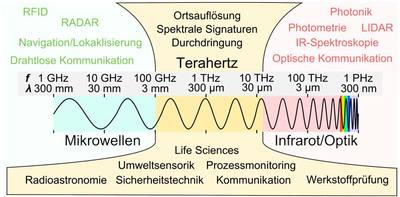Sensors are an indispensable part of everyday’s life : In every small technical device many sensors are installed such as location and touch sensors in mobile phones, gas sensors in automobiles and incinerators that detect pollutants or step and pulse sensors in watches.
However, many applications, especially in the fields of environmental sensors and bioanalytics, as well as in Real time Monitoring, require innovative Sensor concepts. The primary objective of the project is therefore to establish an interdisciplinary research focus for new sensor technologies in the terahertz frequency range between 0.1 THz and several 10 THz, based on the interaction of the electromagnetic fields of sensor structures with the investigated materials / substances or biological tissue.
The current state of THz research is characterized by high dynamics in terms of technology and opening up new application fields. Science, Industry and business hope for a number of new applications of the THz systems, since this frequency range has two distinctive features: a better spatial resolution compared to microwave and a better penetration of many substances, materials and biological tissue compared to the infrared radiation Moreover there are unique spectral signatures ( resonances) of numerous molecular and macromolecular structures (spectral fingerprints) that allow detection and characterization of many substances and mixtures. In addition to the basic research of new sensor principles and concepts the development of innovative, cost-effective and efficient enabling technologies for THz sensors and their system integration is in the foreground. The international interests in new THz technology increases greatly. The internationally recognized expert Masayoshi Tonouchi summarizes the research needs in Nature Photonics as follows: "... we need higher -power THz sources, more sensitive THz sensors, and more functional devices and materials."
The scientific objective of the focus "Sensors towards Terahertz" is the application- oriented basic research in three areas of work: THz sensors and sensor concepts , THz technology and THz technology and sensor systems . The project is therefore complementary to the already existing LOEWE focus "Cooperative sensor communication."
Partners:
Project Funding:
|
 |



